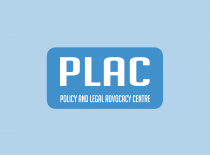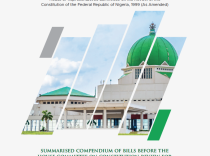The Senate Committee on Independent National Electoral Commission (INEC) on Wednesday, 18 October 2017 organized an interactive session with the INEC Chairman Prof. Mahmood Yakubu at the National Assembly. The interactive session, which was open to members of the public, was aimed at discussing the implementation plans that INEC had commenced in preparation of the forth-coming Governorship elections in Anambra State, the 2019 general elections and other related matters.
During the session, Prof. Yakubu stated that 37 political parties had conducted their primary elections and nominated candidates that would be contesting in the governorship elections. He also mentioned that the Anambra Governorship elections which has been scheduled to hold on 18 November 2017 would be conducted alongside the State Constituency Elections in Idemili North following the declaration of a vacancy by the Speaker of the Anambra State House of Assembly.
Prof. Yakubu mentioned that in preparation of the governorship elections, INEC had:
- Conducted 2 Continuous Voters’ Registration (CVR) exercises which comprised of on-going voters’ registration at the Local Government and Ward level;
- Registered 200,000 new voters;
- Recorded 90% success in the production and distribution of Permanent Voters Card (PVC);
- Commenced distribution of copies of voters registers to various Polling Units in the State and;
- Recruited 23, 854 Ad-hoc Staff;
However, the INEC Chairman also spoke on the issue of security challenges as he expressed concerns over the campaign of the Indigenous People of Biafra (IPOB) to prevent the gubernatorial election in Anambra State from taking place. He also cited the issue of bribery/distribution of money by political parties to influential stakeholders and Nigeria’s peculiar problem with “Godfatherism” in political settings. However, he reassured Members that INEC had put in place various measures aimed at addressing these concerns such as in its mass deployment of security personnel to Polling Units, Registration Area Centres (RACs) and Collation Centres in Anambra State. Furthermore, he stated that INEC had already accomplished 9 out of the 14 activities that it had set out as goals in the forthcoming elections.
Speaking further on the preparations for the 2019 General Elections, the INEC Chair noted the development of an Election Project Plan (EPP), which would serve as its strategic guide for the conduct of credible elections in Nigeria. He urged the Senate in his concluding remarks, to prioritize the timely passage of the Electoral Act Amendment Bills before the National Assembly, as it would further strengthen the electoral process.
Responding to the Chairman’s briefing, the Senate expressed reservations over the effectiveness of the Smart Card Readers, location of INEC offices at various Local Government Areas, the displacement of voters due to insurgency in the North East geo-political zone and demanded to know the measures that had been put in place to address these issues. Members of the Committee were also of the view that volunteers should be used for the conduct of elections rather than paid ad-hoc Staff due to the large constraint in resources. Nonetheless, the meeting ended with Members of the Committee applauding INEC’s initiative in developing an EPP that would hopefully improve the quality of elections in Nigeria.





